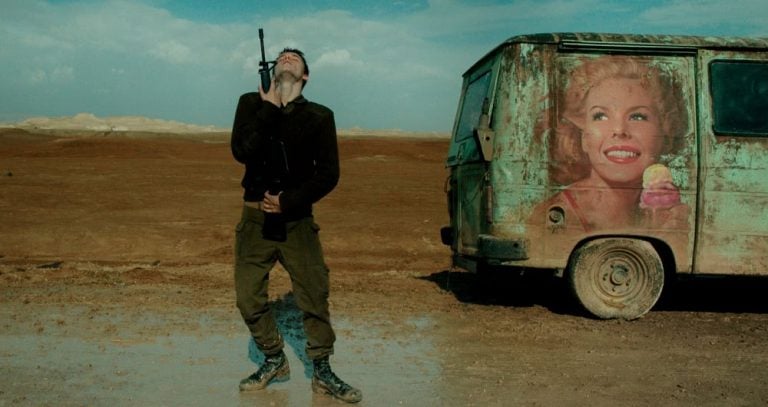Rarely do we see behind the closed doors of other people’s grief. In Israeli director Samuel Maoz’s Foxtrot, we witness the impact on the parents of young soldiers who receive that fatal knock on their doors. And we feel the invasiveness of the Israeli Defence Forces’ presence as they make funeral arrangements just hours after the protagonist Michael Feldmann learns of his son’s death.
It’s these fleeting moments in Foxtrot that leave a dull ache in your chest. The way mother Dafna Feldmann sullenly reasons with throwing away her son’s things, saying: “I couldn’t stand how things lose my child’s scent,” as if his possessions were cruelly rejecting his memory. The way Michael holds his hand under boiling water for far too long. The way the silence in the initial scenes feels deafening.
Watch the Foxtrot trailer here:
When asked what research Maoz had to do to capture these scenes with honesty, there’s a pause on the line. “Nothing!” Nothing? “Nothing, no. I just talked from my experience. From the things that I know that everybody knows here in Israel,” he explains.
Foxtrot is not simply an examination of grief. Maoz presents an unapologetic critique of the Israeli Defence Forces, a point that mustn’t have been easy to make to a country with compulsorily conscription. “This is not an army of mercenaries, this is the people’s army – our army reflects us,” he says.
“I wanted to tell a personal story that reflects the collective. From a wider perspective I can say that Foxtrot is dealing with the open wound or bleeding soul of the Israeli society with the traumatic circle we are trapped in,” explains Maoz. “I mean, we dance the foxtrot – every generation tries to dance it differently, but like the foxtrot, we always end up at the same point.”
Some years ago Maoz’s daughter made a point of sleeping in and missing her bus to school in Tel Aviv. Cab fees started to pile up. He told her to catch the bus like everyone else. And that day her usual bus exploded, killing dozens. It took him an hour to learn that she had missed it by seconds. “It was the worst hour of my life … I asked myself what I learned from this experience and I realised that I can’t learn much.”
Maoz’s passion for film grew from a young age. His father daydreamed of being an actor and drove a special bus to a cinema outside of Tel Aviv. He’d bring his Maoz to see the films. A particular favourite of his was an old western, The Journey to the West. “Each time where the train goes over the camera, I felt an uplift.”
Watch a clip from Foxtrot here:
On his bar mitzvah his father gave him a gift: an eight-millimetre camera. “The next day I was already on the railroad tracks. I put my new camera between the tracks and waited for the train,” he says, before watching it being smashed into pieces. “This was my first experience,” he laughs. Maoz made dozens of short films before it was his time to serve in the IDF. His father often played the “bad guy.”
Maoz’s first feature film Lebanon explored his firsthand experiences as a tank gunner in the Lebanon war. “As a 20-year-old child who’d never been involved in any act of violence, one morning I found myself in hell – in bloody battles killing people,” he says. “I had feelings of guilt and I can say that I suffered from… how shall I put it? From some small silent post-trauma.”
Foxtrot looks beyond the commonly known effects that PTSD has on veterans. “I’m not the picture of the post-traumatic man,” says Maoz. “I function and work and I’m close with my family … I don’t have nightmares. But this quiet trauma knocked me out of my life for many years.”
Protagonist Michael Feldmann (Lior Ashkenazi) represents this generation of seemingly high functioning Israelis soldiers who were forced to internalise their trauma after witnessing the effects of the holocaust firsthand. They hold their head up, and work hard for their families. “But deep inside, there’s a word for it in Hebrew – it’s srita: They have a scratch in their soul,” explained Ashkenazi to NPR of Israelis like Feldmann.
Trauma passes from generation to generation.
“When [Lebanon] came out I realised that I’m not alone as I felt,” says Maoz. “And that our society produces many versions like me – too many. And suddenly I understood why we as a society why we behave as we do. Our emotional memory of our past traumas, the holocaust followed by surviving wars – this memory is still stronger than any kind of clarity and logic.
“Trauma, you know, passes from generation to generation and is based on the determination that we are in constant existential danger and as a result we are in an everlasting war – now our existential danger has long since past. Our traditional enemies are no longer relevant.”
There is a scene in Foxtrot where an Israeli soldier murders Palestinian teenagers in a snap judgement, mistaking a beer can for a grenade – the military then buries the bodies in an unmarked grave.
“As far as I’m concerned the roadblock is a little cosmos of society,” he says of the middle section of the film. “It’s about a reality that is getting more and more crooked.”
When it comes to breaking the devastating effects of being trapped in the endless dance of a pro-war mentality, Maoz says, “We need a leader with a vision who can understand that from time to time the majority can be wrong.”
Foxtrot is playing as part of Sydney Film Festival. For more SFF content, check our interview with the director of Holiday here.


































